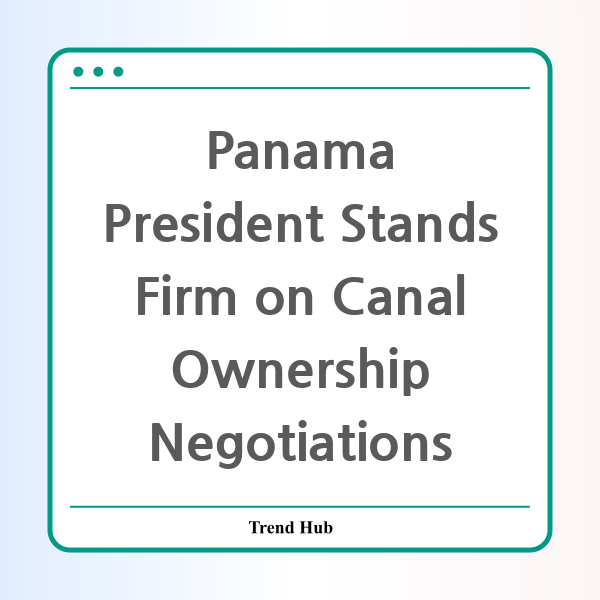* This website participates in the Amazon Affiliate Program and earns from qualifying purchases.

Is the Panama Canal on the chopping block for negotiations with the U.S.? As tensions rise regarding control and management of this vital waterway, Panamanian President José Raúl Mulino has firmly ruled out any discussions about the ownership of the Panama Canal during upcoming talks with U.S. Secretary of State Marco Rubio.
On Thursday, President Mulino made it unequivocally clear that the canal, a crucial asset for both Panama and international shipping, belongs to Panama. His statement comes in the wake of U.S. President Trump’s controversial comments suggesting a potential U.S. takeover of the canal, which is managed by the Panama Canal Authority—a body that operates autonomously under the oversight of the Panamanian government.
Addressing concerns over U.S. intentions, Mulino emphasized that there would be no negotiations regarding the control of the canal. "The canal is ours, and I cannot negotiate its control," he stated, reinforcing Panama's sovereignty over the strategic waterway. Instead, he expressed his hope that Secretary Rubio’s visit could pivot the dialogue towards issues that truly matter to both nations, such as immigration challenges and drug trafficking—two pressing matters affecting regional stability.
Furthermore, Mulino highlighted a desire to clarify misconceptions surrounding China's involvement in the canal's operations. He reassured that Panama respects the rule of law, making it clear that discussions involving the withdrawal of concessions from companies associated with China are not on the agenda. The country is currently awaiting the findings of an audit concerning CK Hutchinson's financial dealings with the Panamanian government, showcasing a commitment to transparency and due process.
This assertive stance by President Mulino comes at a critical time, as Panama seeks to strengthen its diplomatic ties with the Trump administration. The impending bilateral meeting marks a significant step in enhancing cooperation on mutual interests, and Mulino aims to position Panama as a key partner in addressing broader regional issues.
One of the primary topics for discussion will be immigration, a contentious subject in U.S.-Central American relations. Mulino hopes to work collaboratively on strategies to manage migration flows and tackle the root causes driving individuals to leave their homes.
Additionally, the fight against drug trafficking remains a high priority for both Panama and the United States. The two nations share a commitment to combatting drug-related crime and maintaining regional security, and Mulino’s administration is eager to explore joint initiatives to address this pervasive issue.
As the diplomatic meeting approaches, Panama's strategy appears to be focused on a 'charm offensive' aimed at fostering goodwill and demonstrating its importance as a stable partner in the region. The successful navigation of these discussions could set a foundation for a more collaborative relationship moving forward, showcasing Panama not just as a geographic hub, but as an essential player in addressing larger regional and global challenges.
In conclusion, President Mulino's firm stance on the Panama Canal's ownership marks a significant moment in U.S.-Panama relations. With an eye toward cooperation and mutual interests in addressing migration and security, the upcoming dialogue with Secretary Rubio may usher in a new era of partnership shaped by respect for sovereignty and shared goals.
* This website participates in the Amazon Affiliate Program and earns from qualifying purchases.